Women’s contributions to health policy, research and practice globally have a profound impact on health systems and livelihoods. Yet global health leadership is overwhelmingly male – 70 per cent, according to Global Health 50/50’s 2020 Report. While lack of diversity in leadership persists, public commitments to gender equality by organizations active in health are on the rise. Change will take time, and addressing gender inequalities – in the provision of healthcare, health outcomes, and in career pathways in health – will require concrete action.
As the world observed International Women’s Day 2020, CSIH asked Canadian women experts and emerging leaders engaged in global health: How are you advancing gender equality in global health leadership through your work? What does a gender-equal global health landscape mean to you?
Here's what they had to say:
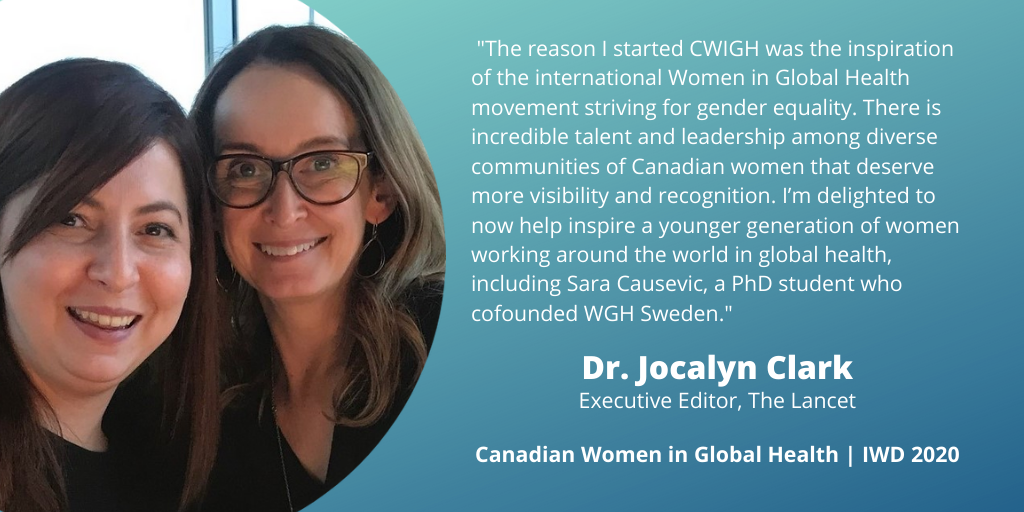
Canadian Women in Global Health (#CWIGH) Co-Founder Jocalyn Clark is an award-winning public health scientist and Executive Editor at The Lancet. Among numerous other projects, Jocalyn leads efforts on Lancet Women, which aims to advance women in science, medicine, and global health.
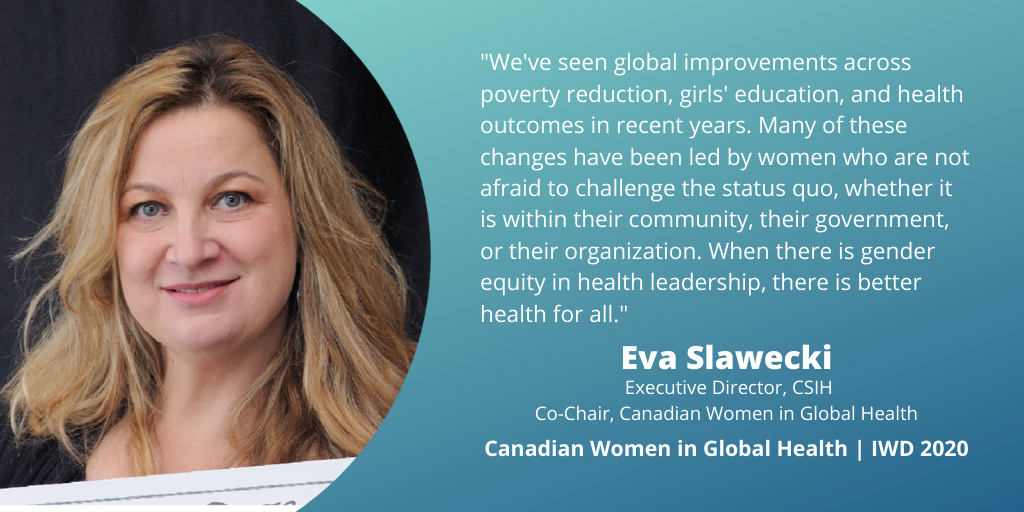
Canadian Women in Global Health Co-Founder Eva Slawecki is Executive Director at CSIH. She has +15 years of experience overseeing global health and development projects focussed on health systems strengthening, and the annual Canadian Conference on Global Health. She is also a Board Member of the Canadian Partnership on Women and Children’s Health (CanWaCH).
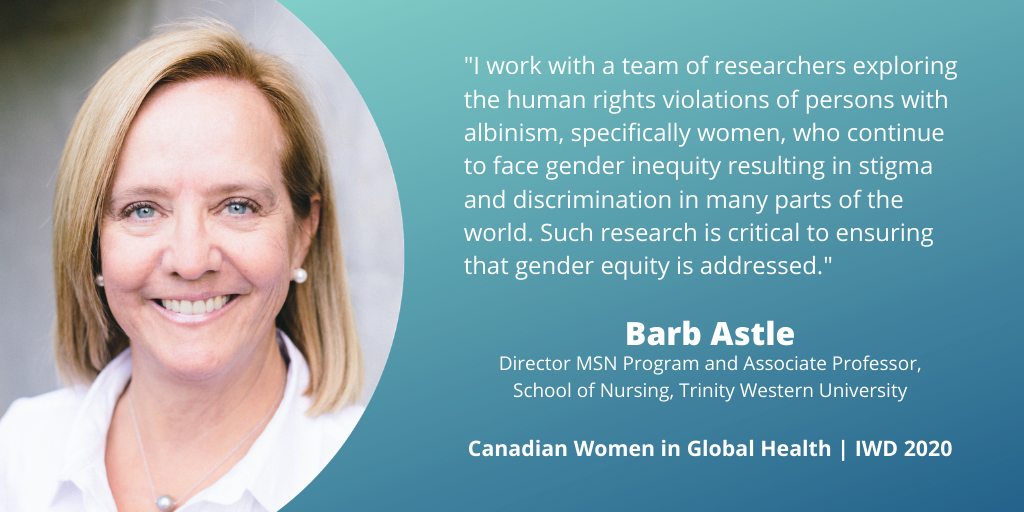
Dr. Barbara Astle is recognized as a leader in global health education. She is an Associate Professor of Nursing and Director of the MSN Program at Trinity Western University in British Columbia. She joins the 2020 Canadian Women in Global Health Working Group.
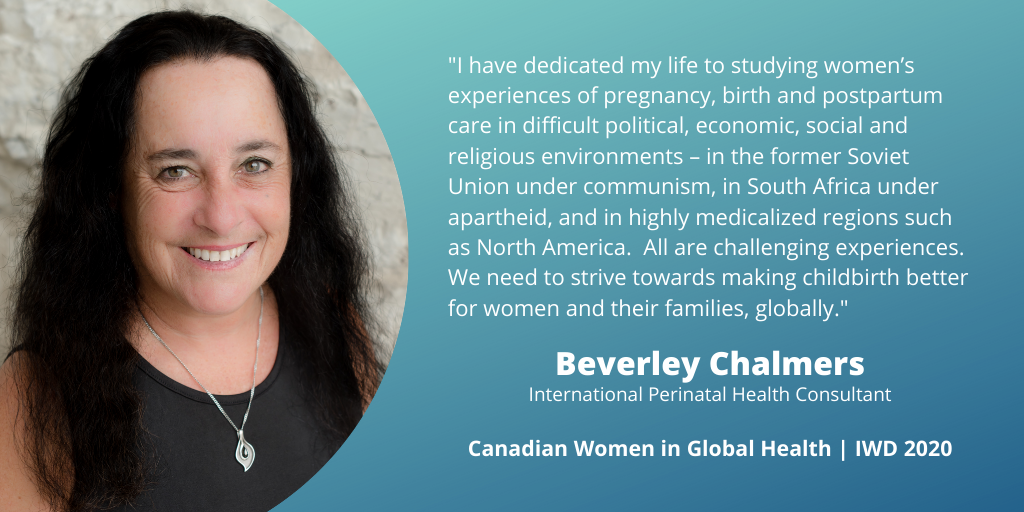
Beverley Chalmers is an international perinatal health consultant. She has provided expertise to the WHO/UNICEF Baby Friendly Hospital initiative and appropriate obstetric care programs to UN agencies. She has over 300 publications, and is the lead author of the opening chapter of the revised Canadian National Guidelines for Maternal and Newborn Care, outlining Canada’s philosophy regarding care.
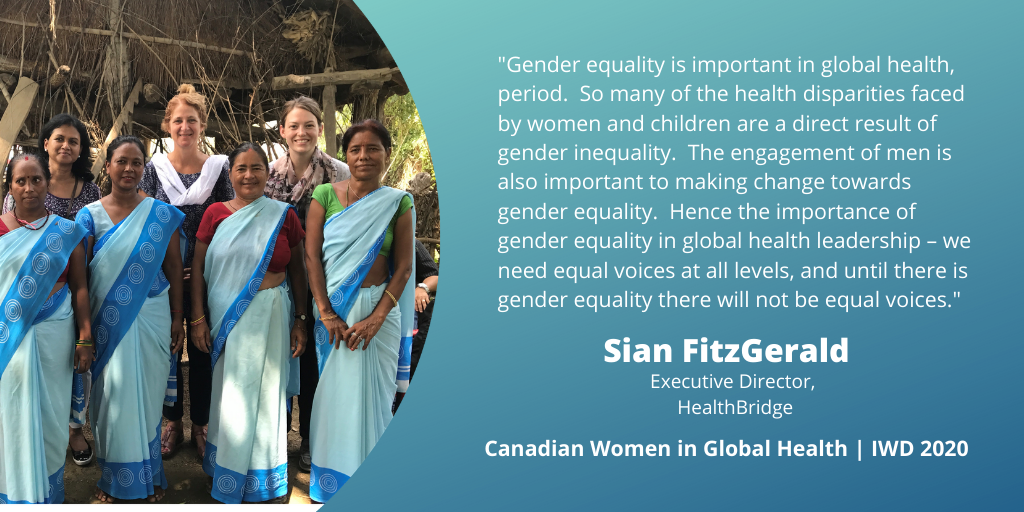
As the Executive Director of the HealthBridge Foundation of Canada, Sian FitzGerald has a wealth of experience in designing and managing projects in global health in developing regions around the world. Most recently, Sian has worked on Global Affairs Canada-funded projects on maternal and child health in India, Nepal, and Vietnam.
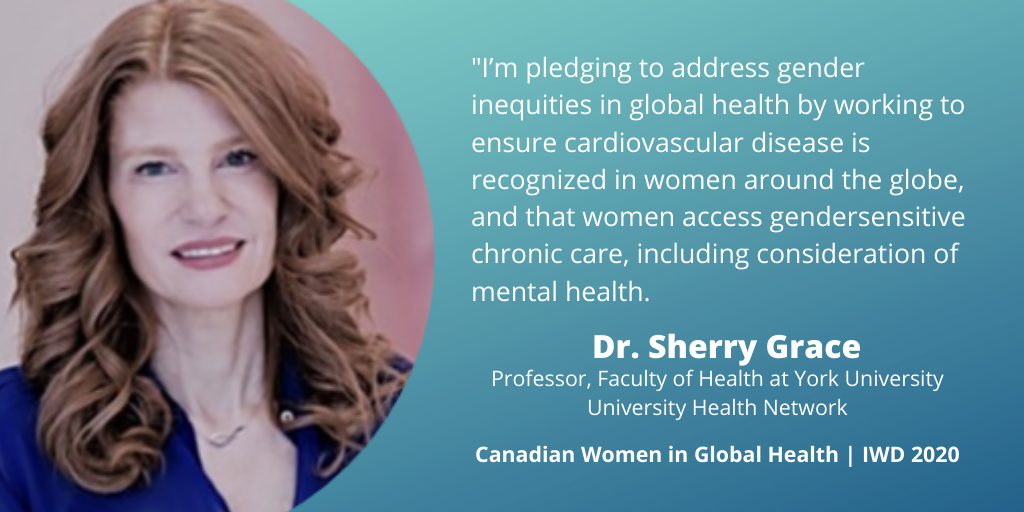
Dr. Sherry Grace is a Professor in the Faculty of Health at York University. She is also appointed at the University Health Network, University of Toronto as Senior Scientist with Toronto Rehabilitation Institute’s Cardiovascular Rehabilitation & Prevention Program, and is Director of Cardiac Rehabilitation Research with the Peter Munk Cardiac Centre. As Chair of International Council of Cardiovascular Prevention and Rehabilitation (ICCPR), Dr. Grace works to harmonize global efforts in promoting cardiovascular prevention and rehabilitation.
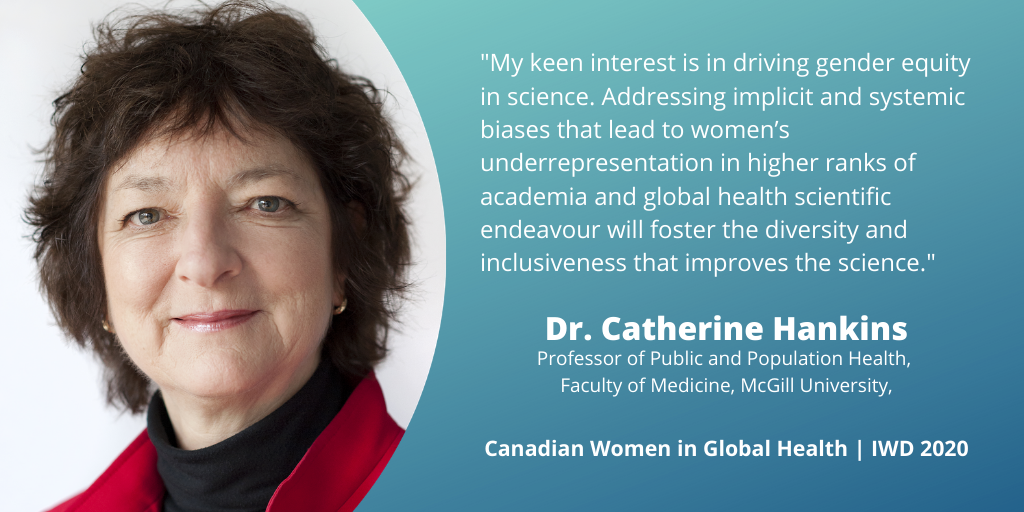
Dr. Catherine Hankins is a community medicine specialist. From 2002 to 2012, she was Chief Scientific Adviser to UNAIDS in Geneva. Her current scientific interests include implementation science, novel biomedical HIV prevention, and participatory research conduct. She was named to the Order of Canada in 2013 for her work on HIV in Canada and globally.
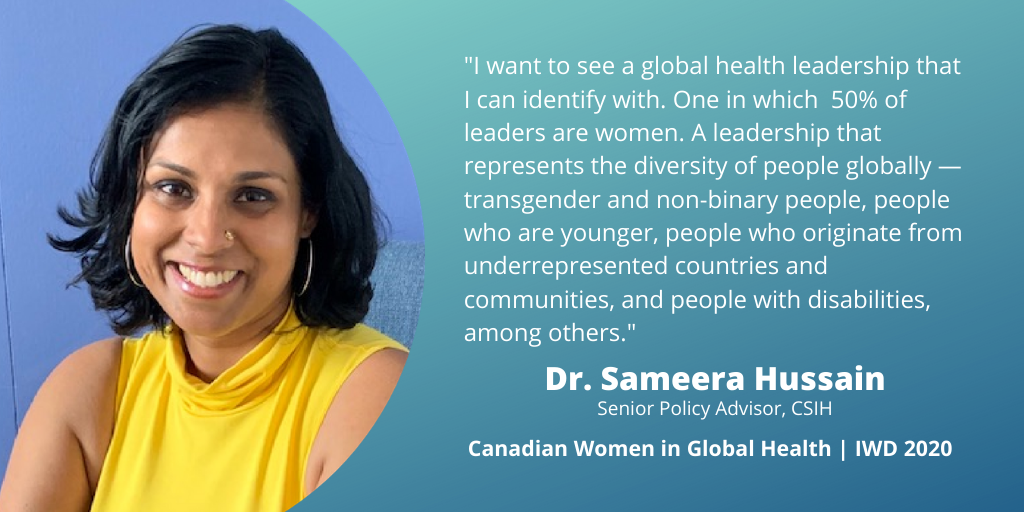
Dr. Sameera Hussain is an award-winning global health scholar mobilizing intersectoral governance and action for health. A life-long human rights advocate, she is a Senior Policy Advisor at CSIH supporting program development for health systems strengthening through addressing the social, political, commercial, and environmental determinants of health. During her recently completed CIHR Health System Impact Fellowship, she guest edited a special article collection of BMC's Globalization and Health Journal entitled "Health in the Sustainable Development Goals: intersectoral action for health".
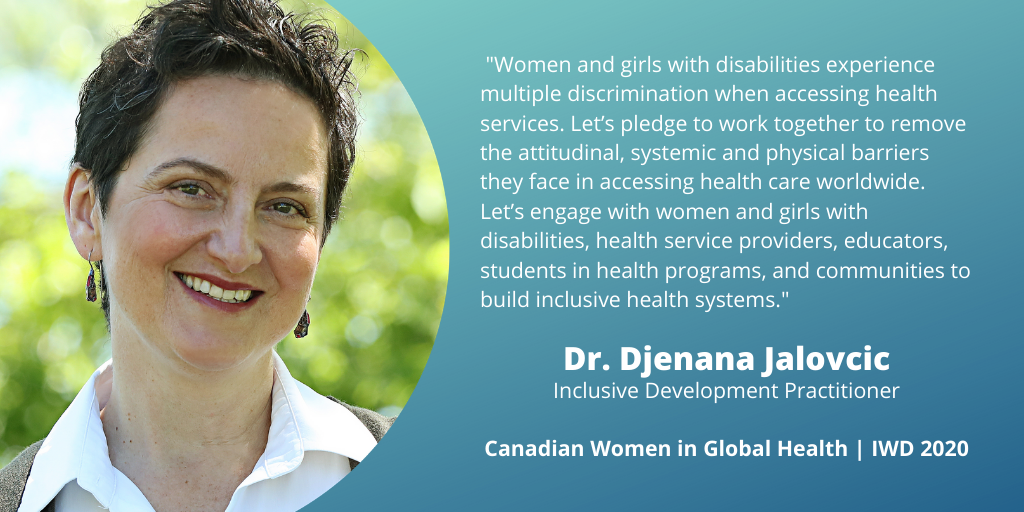
Dr. Djenana Jalovcic is an Associate Professor at the Western Norway University of Applied Sciences in the Department of Health and Functioning. For the last 25 years, Djenana has worked as an Inclusive Development practitioner in over 15 countries around the world, leading inclusive disability, rehabilitation and health projects that promote human rights and access to health for all.
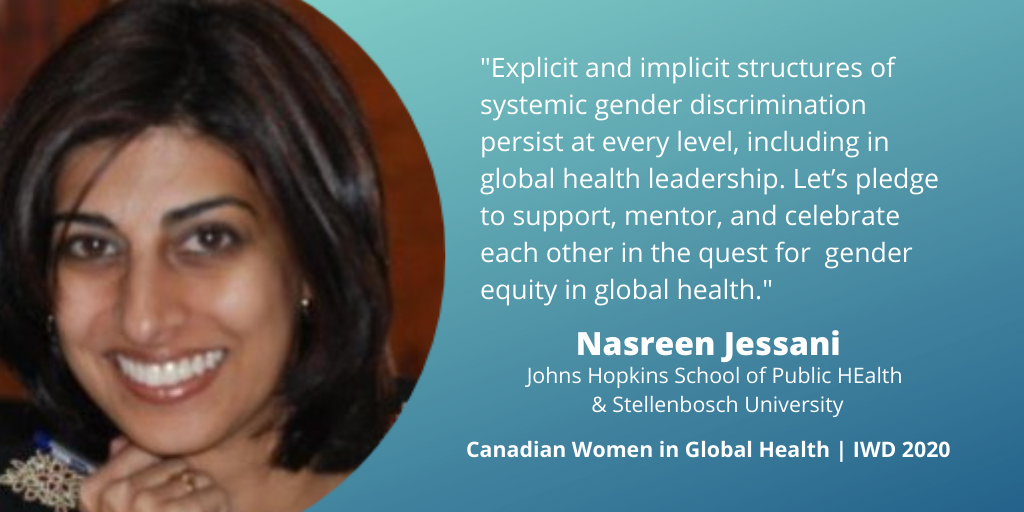
Nasreen Jessani’s research, teaching, and implementation efforts focus on the nexus between health policy and systems research. She currently supports over 15 country teams across Africa and Asia on strategic engagement related to data for decision making through her faculty positions at Johns Hopkins School of Public Health, USA and Stellenbosch University, South Africa.
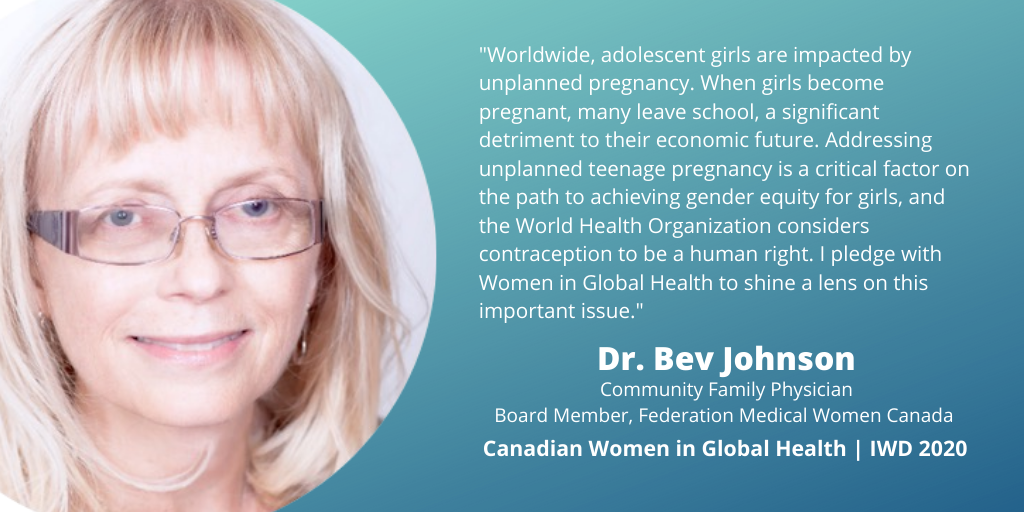
Dr. Bev Johnson is a Community Family Physician, and has provided primary care to families in Ottawa for over 25 years. She is a past President and Board Member of the Federation of Medical Women of Canada, the Canadian member of the Medical Women’s International Association. Dr. Johnson sits on the 2020 Canadian Women in Global Health Working Group.
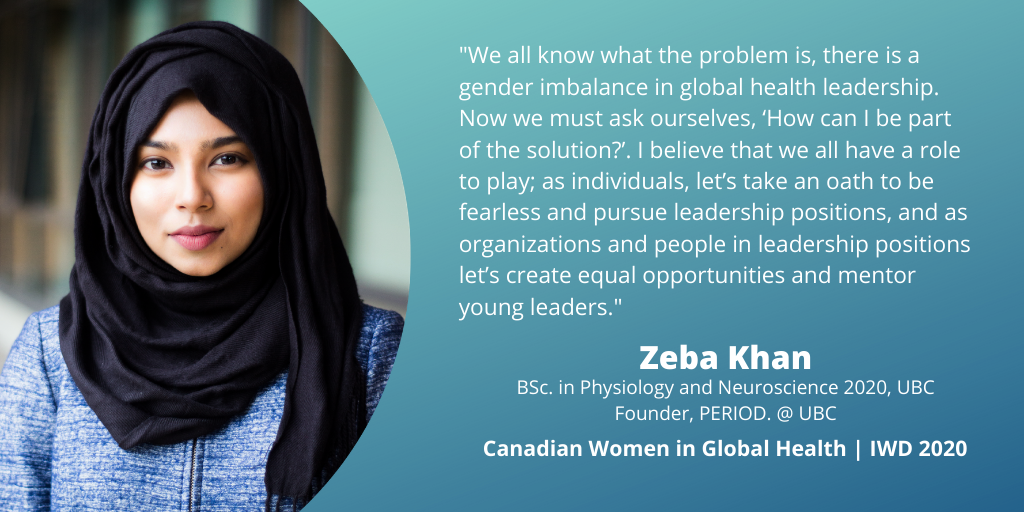
Zeba Khan is the Founder of PERIOD. @ UBC, a nonprofit that distributes menstrual hygiene care packages to Vancouver's communities in need. Since 2017, she has served as PERIOD. Inc. Regional Director in Canada. She attended the 2018 Women Leaders in Global Health Conference in London and has been following #womeninGH movement since then. Looking to pursue a career in public health, Zeba is motivated to do her part in disrupting the gender disparity in global health leadership. Zeba sits on the 2020 Canadian Women in Global Health Working Group.
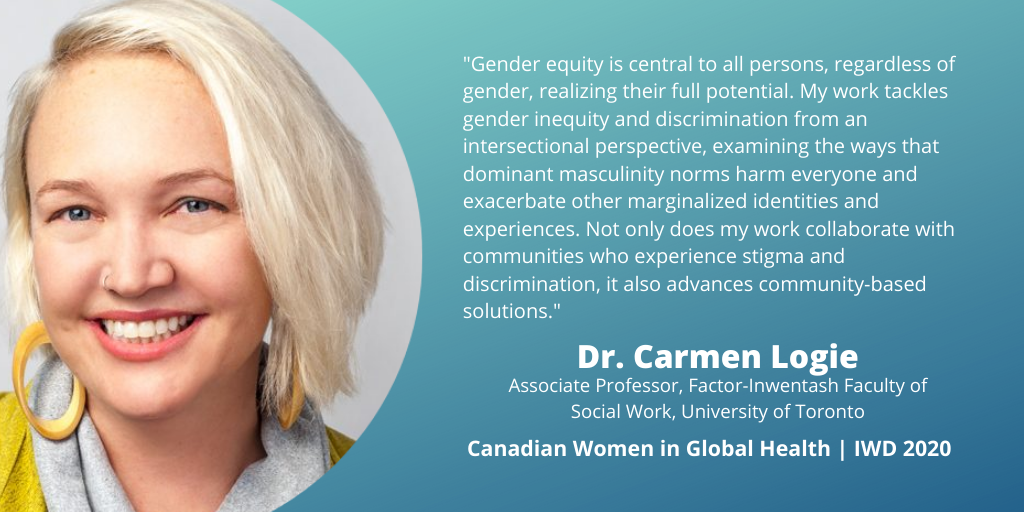
Carmen Logie is an Associate Professor, Factor-Inwentash Faculty of Social Work, University of Toronto, Canada Research Chair in Global Health Equity and Social Justice with Marginalized Populations. She is also an Adjunct Scientist at Women’s College Hospital. Currently, Carmen’s global work is with refugee youth in Uganda with a focus on HIV and STI. Read her new book “LGBTQ Mental Health: International Perspectives” here.
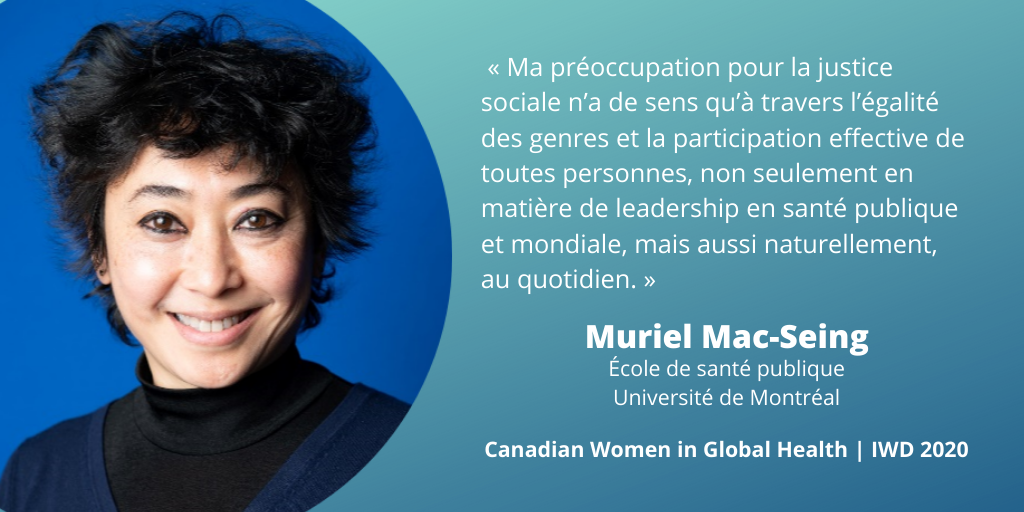
Muriel Mac-Seing is a passionate advocate of social justice for marginalised populations, notably people with disabilities to exercise their human rights and have a fair access to health. Prior to her PhD candidacy at the Université de Montréal, she was involved in a number of initiatives around SRHR, including the Global Fund to Fight AIDS, Tuberculosis and Malaria. Along with being recognized as a CWIGH leader, she was one of 200 Francophone Women in Global Health Leaders.
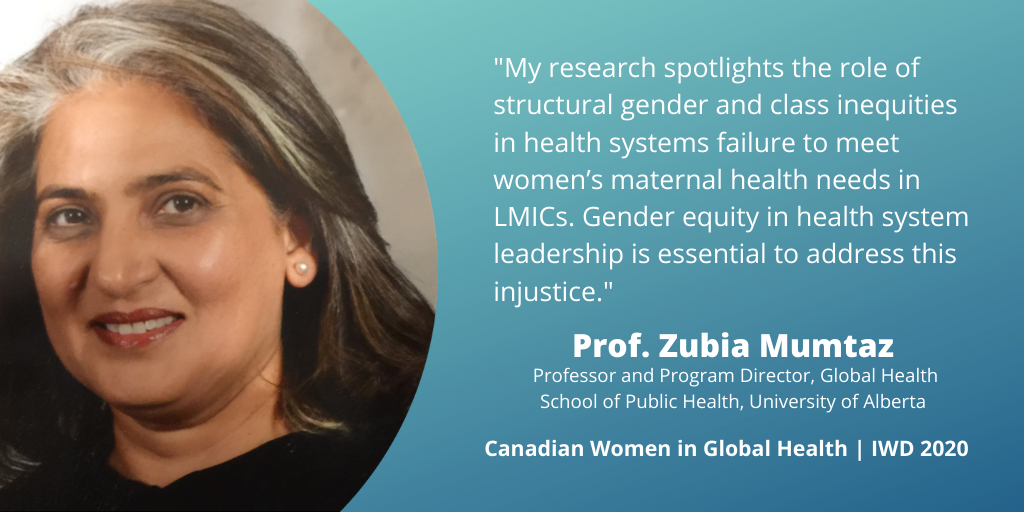
Dr. Zubia Mumtaz is a Professor and Program Director of the Global Health Program at the University of Alberta’s School of Public Health. Established in Pakistan and Malawi, her research programs are focused on maternal and reproductive health, with a focus on developing innovative solutions to address high maternal mortality in countries with fragile health systems.
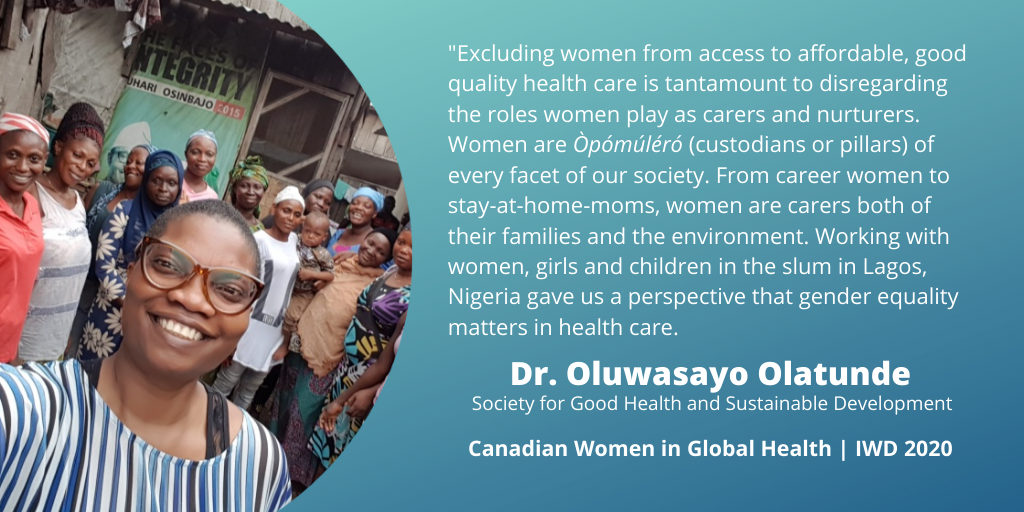
Before coming to Canada, Dr. Oluwasayo Olatunde ran an NGO in Nigeria for over ten years, working with refugees and displaced persons. Oluwasayo actively volunteers with victims of sexual assault groups and immigrant communities. In the past five years, she formed the Society for Good Health, an organization leading research, seminars, empowerment sessions, health equipment donations, scholarships, rural and mobile health clinics, provision of well in a rural community, and the teaching of medical students and residents in Nigeria.
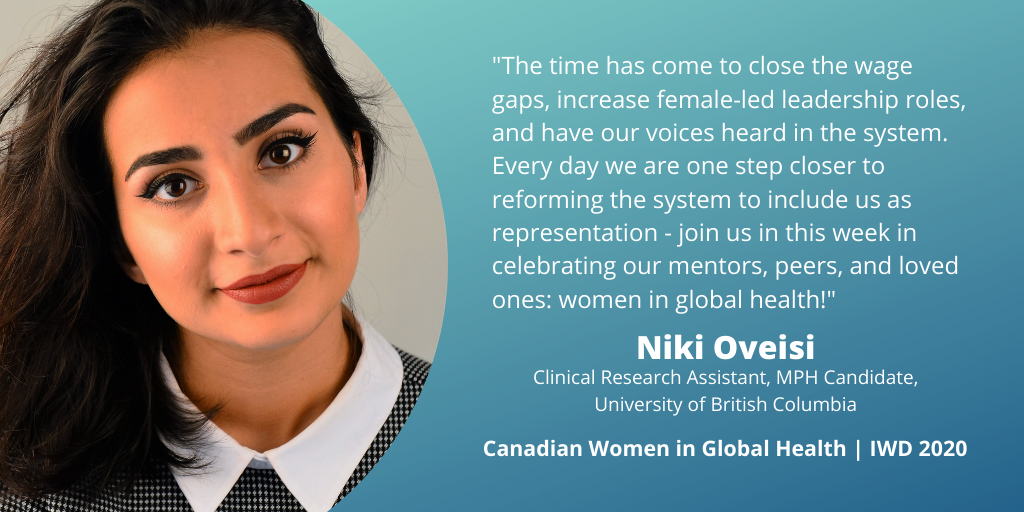
A clinical research assistant at the Djavad Mowafaghian Centre for Brain Health at UBC and a Master of Public Health student, Niki Oveisi has been involved in advocacy for vulnerable populations for years now. Her work has revolved around the battle against period poverty and a push for awareness in menstrual equity, combined with supporting caregivers and patients of dementia. Niki sits on the 2020 Canadian Women in Global Health Working Group.
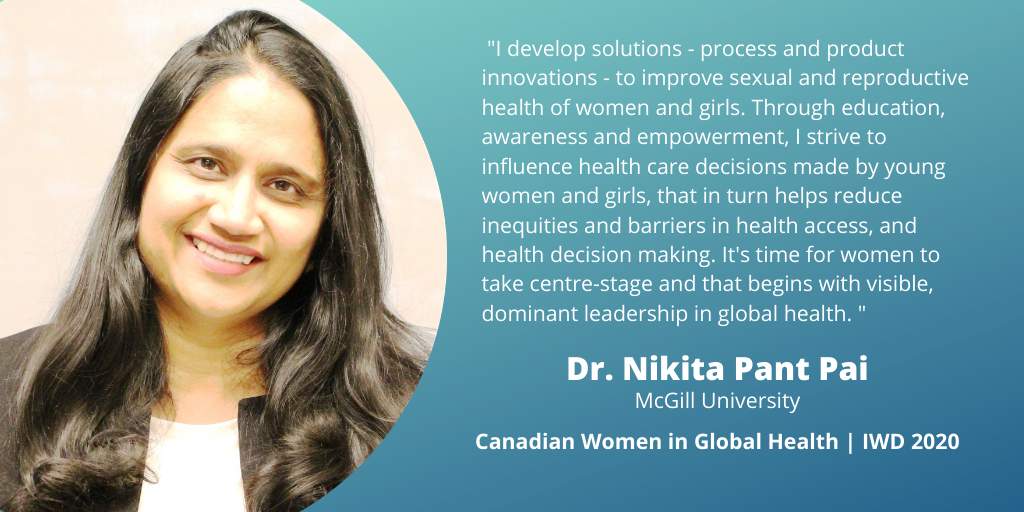
Dr. Nitika Pant Pai is an Associate Professor at McGill University in the Department of Medicine, Division of Clinical Epidemiology, and a Research Scientist at the Research Institute of the McGill University Health Centre. Dr. Pant Pai’s research expertise is on point of care diagnostics for HIV and sexually transmitted blood borne infections, working to develop innovations for young women, aimed to plug gaps in screening, access, and linking people to care.
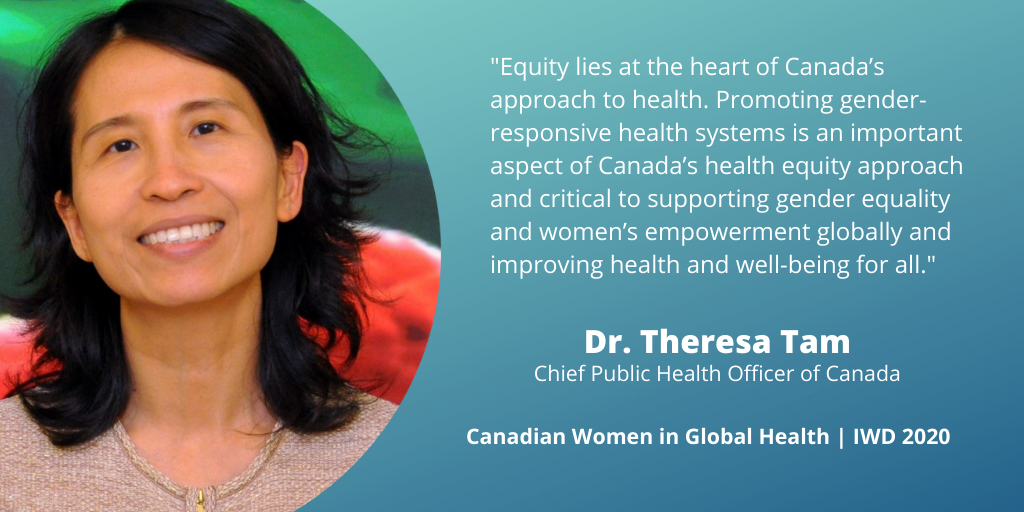
Dr. Theresa Tam was named Canada’s Chief Public Health Officer in June 2017. She has played a leadership role in Canada’s response to public health emergencies. Dr. Tam has served as an international expert on a number of World Health Organization committees and has participated in multiple international missions related to SARS, pandemic influenza and polio eradication.
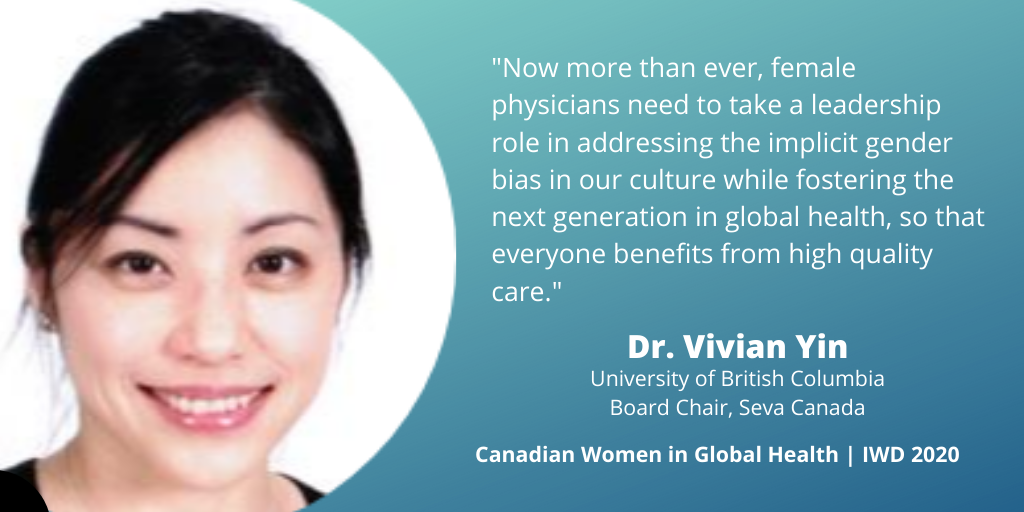
Dr. Vivian Yin is a surgeon, researcher, and teacher in ophtalmology and Chair of the Board at Seva Canada. The global burden of vision impairment affects women and girls the most. Seva Canada’s groundbreaking “Gender and Blindness” resource was adopted by the International Agency for the Prevention of Blindness. Learn more about Seva’s work to promote #EqualRight2Sight here.
Consult the 2018 List of Canadian women experts in global health here.
